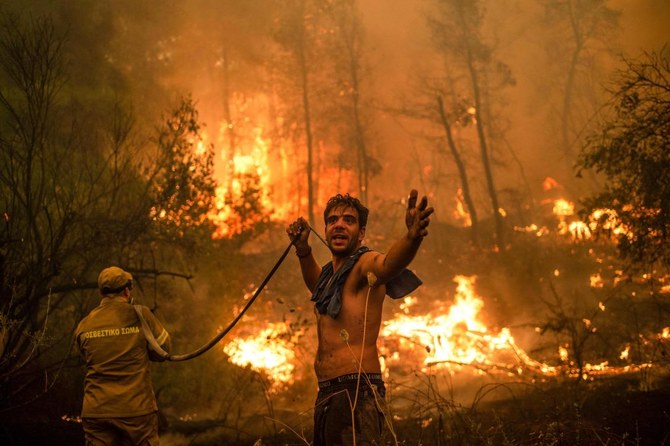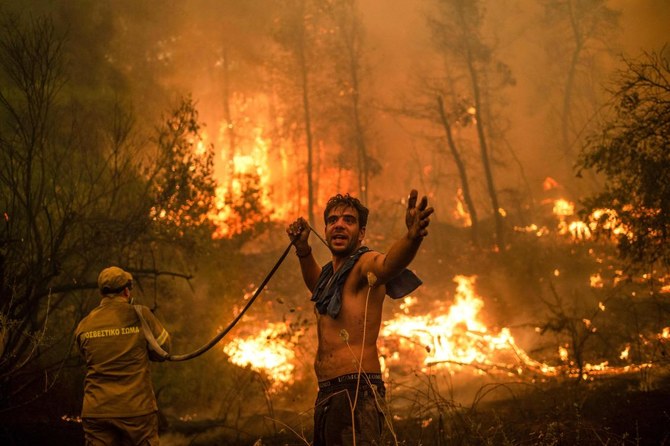PEFKI, Greece: Firefighters battled heat and suffocating smoke for a seventh consecutive day Monday on Greece’s Evia Island, swept by the most destructive of the wildfires that have destroyed hundreds of homes and forced thousands to flee.
Greece and neighboring Turkey have been battling devastating blazes for nearly two weeks as the region suffers its worst heatwave in decades.
The wildfires continue as an alarming UN climate report warned that the planet is warming faster than previously estimated.
Two people have been confirmed dead in Greece and eight in Turkey, while dozens have been hospitalized.
While most of the fires that have blazed elsewhere in Greece for nearly two weeks have stabilized or receded, the ones on rugged and forested Evia — Greece’s second largest island after Crete — were the most worrying, creating apocalyptic scenes.
Authorities were on Monday putting the priority on saving the villages of Kamatriades and Galatsades because “if the fire passes through there, it will end up in a thick forest that will be difficult to extinguish,” firefighters told the Greek news agency ANA.
As the sweeping wall of fire laid siege to one village after another on the north of the island, firefighters toiled until dawn to quench flames at Monokarya in order to protect the town of Istiaia, all without the help of water-dousing aircraft, ANA reported.
Thick and suffocating smoke on Monday also enveloped the coastal region of Pefki, where hundreds of villagers had been evacuated by sea, while others regrouped, an AFP reporting team said.
Around 300 people evacuated from surrounding villages spent the night in a ferry moored near the long beach. Looming in the haze offshore, a military ship awaited further evacuees.
The ferry “was the only place where people could get a little peace and security,” a military official, Panagiotis Charalambos, told AFP.
Like many nearby communities, Pefki “had no electricity or water,” he said.
“Here, the people lived from the forest, from the crops, olives and tourism. There’s nothing of that left now,” said Louisa, a penioner in Pefki.
Finance Minister Christos Staikouras said up to 6,000 euros per household would be allocated to residents whose homes were damaged, as well as 4,500 euros for the injured.
In the town of Aidipsos, collections of basic necessities were organized for villagers who had lost everything in the fire.
“Have you seen the state offer us water? Snacks for the children? No one! They are just letting shopkeepers and individuals give water to people,” Pefki resident Giorgos told AFP.
While rain brought some respite from the blazes in Turkey over the weekend, Greece continued to suffer from an intense heatwave that Greek Prime Minister Kyriakos Mitsotakis said should show even doubters the hard reality of climate change.
Monday’s report by the UN’s Intergovernmental Panel on Climate Change concluded that the 1.5C temperature goal of the Paris Agreement would likely be breached around 2030 — a decade earlier than it projected just three years ago.
Meanwhile the EU said it was mobilizing “one of Europe’s biggest ever common firefighting operations” to assist Greece and other countries.
The response was needed “as multiple fires affect several countries simultaneously,” EU crisis management commissioner Janez Lenarcic said.
Giorgos Kelaitzidis, Evia’s deputy governor, echoed many when he blasted the “insufficient forces” to fight the fires while “the situation is critical” on the island.
He said at least 35,000 hectares of land and hundreds of homes have been burned.
From July 29 to August 7, 56,655 hectares (140,000 acres) were burnt in Greece, according to the European Forest Fire Information System.
The average area burnt over the same period between 2008 and 2020 was 1,700 hectares.
Some 650 firefighters have so far been deployed on Evia, according to Greek authorities.
But the air support faced “serious difficulties” because of turbulence, thick smoke and limited visibility, Greece’s Civil Protection deputy minister Nikos Hardalias said.
The situation looked better elsewhere, with officials saying that fires in the southwestern Peloponnese region and in a suburb north of Athens had abated. A fire on Crete was brought under control.
But Hardalias warned the risk of fires resurging was heightened.
Firefighters try to stop Greek island blaze from reaching forest
https://arab.news/pmf9r
Firefighters try to stop Greek island blaze from reaching forest

- Wildfires continue as an alarming UN climate report warned that the planet is warming faster than previously estimated
- Two people are confirmed dead in Greece and eight in Turkey, while dozens have been hospitalized
Hamas says ‘new’ Israeli conditions delaying agreement on Gaza ceasefire

“The ceasefire and prisoner exchange negotiations are continuing in Doha under the mediation of Qatar and Egypt in a serious manner... but the occupation has set new conditions concerning withdrawal (of troops), the ceasefire, prisoners, and the return of displaced people, which has delayed reaching an agreement,” the Palestinian militant group said in a statement.
Syria authorities say 1 million captagon pills torched

- Forces pour fuel over and set fire to a cache of cannabis, the painkiller tramadol and around 50 bags of pink captagon pills in the capital’s security compound.
DAMASCUS: Syria’s new authorities torched a large stockpile of drugs on Wednesday, two security officials told AFP, including one million pills of the amphetamine-like stimulant captagon, whose industrial-scale production flourished under ousted president Bashar Assad.
“We found a large quantity of captagon, around one million pills,” said a member of the security forces, who asked to be identified only by his first name, Osama. An AFP journalist saw forces pour fuel over and set fire to a cache of cannabis, the painkiller tramadol and around 50 bags of pink captagon pills in the capital’s security compound.
UK to host Israel-Palestine peace summit

- PM Starmer drawing on experience working on Northern Ireland peace process
- G7 fund to unlock financing for reconciliation projects
LONDON: The UK will host an international summit early next year aimed at bringing long-term peace to Israel and Palestine, The Independent reported.
The event will launch the International Fund for Israeli-Palestinian Peace, which is backed by the Alliance for Middle East Peace, containing more than 160 organizations engaged in peacebuilding between Israelis and Palestinians.
Prime Minister Keir Starmer, a former human rights lawyer who worked on the Northern Ireland peace process, ordered Foreign Secretary David Lammy to begin work on hosting the summit.
The fund being unlocked alongside the summit pools money from G7 countries to build “an environment conducive to peacemaking.” The US opened the fund with a $250 million donation in 2020.
As part of peacebuilding efforts, the fund supports projects “to help build the foundation for peaceful co-existence between Israelis and Palestinians and for a sustainable two-state solution.”
It also supports reconciliation between Arab and Jewish citizens of Israel, as well as the development of the Palestinian private sector in the West Bank and Gaza Strip.
Young Israelis and Palestinians will meet and work together during internships in G7 countries as part of the scheme.
Former Labour Shadow Middle East Minister Wayne David and ex-Conservative Middle East Minister Alistair Burt said the fund is vital in bringing an end to the conflict.
In a joint piece for The Independent, they said: “The prime minister’s pledge reflects growing global momentum to support peacebuilding efforts from the ground up, ensuring that the voices of those who have long worked for equality, security and dignity for all are not only heard, but are actively shaping the societal and political conditions that real conflict resolution will require.
“Starmer’s announcement that the foreign secretary will host an inaugural meeting in London to support peacebuilders is a vital first step … This meeting will help to solidify the UK’s role as a leader in shaping the future of the region.”
The fund is modeled on the International Fund for Ireland, which spurred peacebuilding efforts in the lead-up to the 1999 Good Friday Agreement. Starmer is drawing inspiration from his work in Northern Ireland to shape the scheme.
He served as human rights adviser to the Northern Ireland Policing Board from 2003-2007, monitoring the service’s compliance with human rights law introduced through the Good Friday Agreement.
David and Burt said the UK is “a natural convener” for the new scheme, adding: “That role is needed now more than ever.”
They said: “The British government is in a good position to do this for three reasons: Firstly, the very public reaching out to diplomatic partners, and joint ministerial visits, emphasises the government turning a page on its key relationships.
“Secondly, Britain retains a significant influence in the Middle East, often bridging across those who may have differences with each other. And, thirdly, there is the experience of Northern Ireland.
“Because of his personal and professional engagement with Northern Ireland, Keir Starmer is fully aware of the important role civil society has played in helping to lay the foundations for peace.”
Erdogan announces plans to open Turkish consulate in Aleppo

- Erdogan also issued a stern warning to Kurdish militants in Syria
Turkish President Recep Tayyip Erdogan announced on Wednesday that Turkiye will soon open a consulate in Syria's Aleppo.
Erdogan also issued a stern warning to Kurdish militants in Syria, stating they must either "lay down their weapons or be buried in Syrian lands with their weapons."
The remarks underscore Turkiye's firm stance on combating Kurdish groups it views as a threat to its national security.
Turkish military kills 21 Kurdish militants in northern Syria and Iraq, ministry says

- Turkiye regards the YPG, the leading force within the US-backed Syrian Democratic Forces (SDF), as an extension of the PKK and similarly classifies it as a terrorist group
ANKARA: The Turkish military killed 21 Kurdish militants in northern Syria and Iraq, the defense ministry said on Wednesday.
In a statement, the ministry reported that 20 Kurdistan Workers Party (PKK) and Syrian Kurdish YPG militants, who were preparing to launch an attack, were killed in northern Syria, while one militant was killed in northern Iraq.
“Our operations will continue effectively and resolutely,” the ministry added.
The PKK, designated as a terrorist organization by Turkiye, the European Union, and the United States, began its armed insurgency against the Turkish state in 1984. The conflict has claimed more than 40,000 lives.
Turkiye regards the YPG, the leading force within the US-backed Syrian Democratic Forces (SDF), as an extension of the PKK and similarly classifies it as a terrorist group.
Following the fall of Syrian President Bashar Assad earlier this month, Ankara has repeatedly insisted that the YPG must disband, asserting that the group has no place in Syria’s future.
The operations on Wednesday come amid ongoing hostilities in northeastern Syria between Turkiye-backed Syrian factions and the YPG.
Ankara routinely conducts cross-border airstrikes and military operations targeting the PKK, which maintains bases in the mountainous regions of northern Iraq.















